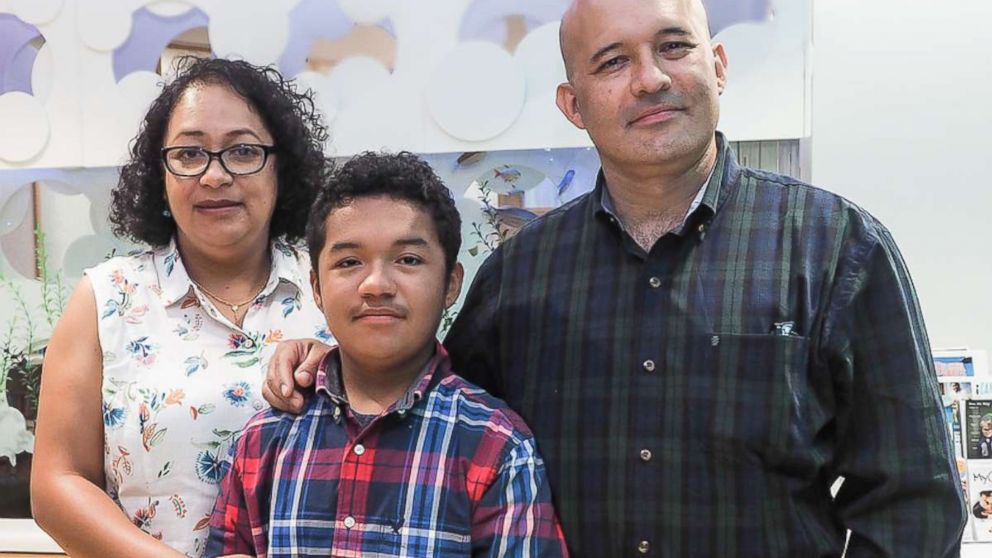
Santiago Rodriguez, 14, has been fighting a rare, life-threatening genetic disease since he was born, with his loving parents at his side each step of the way. Now, his father is facing a battle of his own — deportation.
“Please help my family not be split apart,” Santiago told reporters at a press conference earlier this week. “I don’t know what I would do or be doing here without my dad. He’s helped me through so much during my life, he’s always been there to support me and everything, and I really need him.”
Julian Rodriguez and his wife, Diana Cortes, fled guerrilla violence in their home country of Colombia and sought asylum in the United States in 2000. They’ve lived in New London, Connecticut, ever since.
Their son, Santiago, was born in 2003 with chronic granulomatous disease, an inherited immunodeficiency that makes it difficult for the body to fight infections, according to Santiago’s doctor, Juan Salazar, the physician-in-chief at Connecticut Children’s Medical Center in Hartford.
“It occurs in about 1 in 200,000 kids, so it’s extremely rare but it is devastating,” Salazar said at the press conference Tuesday. “The kids who have this disease sometimes grow into adulthood but, at the end, it’s universally fatal.”
Children with chronic granulomatous disease develop severe infections, and Santiago did. Since his official diagnosis at the age of 6, Santiago has been hospitalized eight to 10 times per year, according to Salazar.
“We were actually very concerned for him. His disorder got worse, he developed severe complications from this,” he said.
When Santiago was 8, the National Institutes of Health, a Maryland-based biomedical research agency of the U.S. Department of Health and Human Services, offered an experimental treatment for genetic conditions, and Santiago and his family were invited to participate. The trial involved immunosuppressive therapy and stem cell transplantation, which the Rodriguez family knew could pose a severe and potentially life-threatening risk to Santiago’s health. But with few other options, Santiago agreed to partake and so did his mother, who is believed to carry the defective gene.
The treatment was successful for Santiago. Today, he is a healthy 14-year-old who is looking forward to starting his sophomore year of high school this fall and hopes to play soccer and maybe basketball.
“This was a miracle success,” Salazar told reporters.
But Santiago’s health and wellbeing is now at stake as his father is scheduled to be deported to Colombia on Sept. 12.
Colombia does not have the pediatric specialist needed to treat Julian’s son. And although Santiago is doing “very well,” his doctor said, it’s imperative for the immuno-compromised teen to remain in the country so he can continue receiving essential, post-transplant care at both Connecticut Children’s Medical Center and the National Institutes of Health.
“His care needs to be done in the United States. This is something that cannot be done elsewhere,” Salazar told reporters. “It’s something that has contributed to the overall health care of children. It will allow other children with a similar disorder to receive a similar therapy.”
In 2003, an immigration judge issued Santiago’s father, Julian, a voluntary departure that allowed him to return to his home country within a certain period of time on his own without a removal order, and the appeals board upheld the judge’s decision. In 2009, Julian became the subject of a warrant of deportation and has been granted him multiple stays of removal, spanning from 2010 to 2017, according to the U.S. Immigration and Customs Enforcement.
Julian, who now does not have legal status to remain in the country, has requested another stay of removal, which is “pending and currently under review,” according to an emailed statement from an ICE spokesperson on Wednesday. A stay of removal, when granted, is designed only to provide a temporary relief from deportation.
“I love my family. I couldn’t live without them,” Julian said in Spanish at the press conference Tuesday. “We love each other very much and we’ve always been together. We have had very difficult and trying times. But this would be the worst, that our family could be separated, that my son and my wife could be separated and I could be sent to a place where I wouldn’t be able to help them.”
Julian’s attorney, Glenn Formica, has also filed for a national interest waiver on his behalf, which would halt deportation if it is believed to be in the national interest of the United States. But it takes time for the petition to be processed and a final decision to be made — time which Julian may not have if ICE does not grant him another stay of removal.
“In the meantime, we’re asking ICE as an act of discretion to allow Julian to stay here in the United States and look after his family, as he’s done. Julian has been a model citizen, he pays his taxes, he goes to work, he’s asked nothing of the system,” Formica told reporters. “And all he’s asking now is not to be separated from his family, which would result in his family having an incredible burden, possibly burdening our system if he’s not allowed to stay.”
“He does have a plane ticket for Sept. 12, he is trying to follow their order and comply. But please let us know soon,” Formica said in a direct appeal to immigration officials.
Charla Nich of Connecticut Shoreline Indivisible, a local activist group that is advocating for Julian’s stay, told ABC News on Saturday that the Rodriguez family is still awaiting a decision from ICE but remains hopeful.
Julian, 50, and Diana, 46 each have jobs to support their family and are actively involved in their community. Julian is a spot welder and plays the bass in their church’s band. Diana works as a housekeeper and volunteers at the church’s Sunday school.
Kica Matos, director of immigrant rights and racial justice at the Center for Community Change in Washington, D.C., said “splitting the family apart and jeopardizing Santiago’s life” would be “immoral” and “makes absolutely no sense to anybody with a heart.”
“Connecticut is their home and we want them to stay here,” Matos said at the press conference. “The future of this beautiful family is in the hands of ICE. The health of an incredible young man that we know as Santi is in the hands of ICE. The potential ongoing contributions to medical science, thanks to Santiago and his mother Diana and Dr. Salazar, they’re in the hands of ICE as well. So we ask ICE to do the right thing and to allow Julian to remain in the United States.”
Sen. Richard Blumenthal (D-Conn.) and Rep. Joe Courtney (D-Conn.) both voiced their support for the Rodriguez family at the press conference and likened their predicament to the nationwide issue of families being separated across the country and, for a time, at the Mexico border, as the Trump administration takes a stricter approach to immigration policy.
“That’s our new deportation policy in this country, and I am ashamed and embarrassed as a citizen, as a parent and as a public official. But this case is really unique,” Blumenthal told reporters. “Never before have we encountered a young man like Santi whose medical care depends on his being here, whose life relies on the docs in this hospital. This case is a matter of life and death.”
“We are going to fight. Vamos a luchar,” the senator added. “Just as Santi has fought, we must fight for him.”





